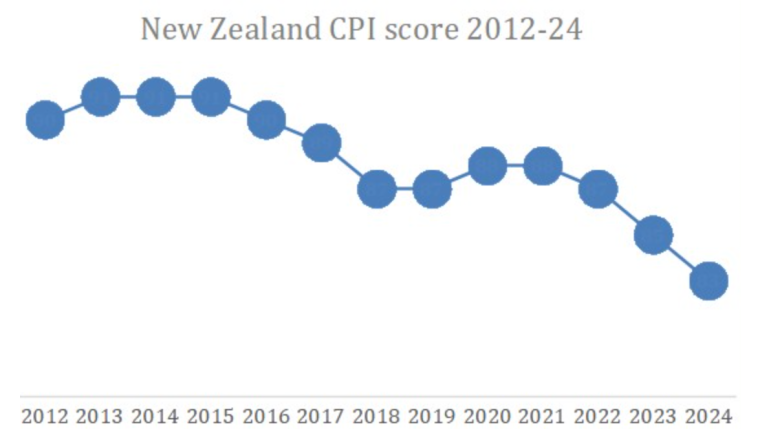
The Serious Fraud Office (SFO) will work with the Police and Public Service Commission on a joint Anti-Corruption Taskforce and pilot programme to build what it describes as a clearer, system‑wide picture of the corruption and fraud risks across the public service.
Led by the SFO, the Taskforce will work with six public service agencies being Inland Revenue, the Accident Compensation Corporation, the Department of Corrections, Ministry of Social Development, Land Information New Zealand and Sport New Zealand.
The aim is to put together an "in‑depth self‑assessment of their fraud and corruption control maturity." The six agencies are also to report on the volume of corruption and fraud they've detected and prevented.
"Tackling public‑sector fraud and corruption is about safeguarding taxpayer funds and protecting New Zealanders’ trust in government. By bringing frontline agencies and enforcement partners together, this will help build a clearer intelligence picture that can be used to lift system resilience and ensure we stay ahead of emerging threats such as insider threats, foreign interference and AI‑enabled fraud," SFO Chief Executive Karen Chang said in a statement.
"Many of the organisations in this pilot are already proactive members of our Counter Fraud Centre community. Their willingness to lift the hood and share data shows a strong tone‑from‑the‑top commitment to integrity. Together we’ll create a baseline that informs more targeted prevention, better detection and, ultimately, stronger enforcement," adds Chang.
On the slide
In February Transparency International's latest annual Corruption Perceptions Index showed New Zealand continuing to slide. The country's score dropped to 83 from 85, seeing the NZ's ranking slip to fourth.
"Whilst still in the top 10 worldwide, New Zealand has surrendered its position as a world leader in integrity and transparency. For many years New Zealand scored ‘least corrupt’ alongside Denmark, now it is now 7 points behind its previous peer," Transparency International said.
"The decline started in 2015 and whilst it recovered briefly in 2020-21 it now appears to be accelerating."
In May a Ministerial Advisory Group on Transnational, Serious and Organised Crime, told Minister of Customs and Associate Minister of Police Casey Costello the perception of NZ as a country largely free from corruption; "is increasingly at odds with a growing body of evidence suggesting that corruption, particularly as it relates to organised crime, is not only present but expanding in scope and sophistication."
Steve Symon, Chairman of the Advisory Group, told Costello the role of corruption as a strategic enabler of organised crime is at the heart of the issue.
"Whether through bribery, coercion, or the exploitation of familial and cultural ties, these groups seek to embed themselves within institutions that are meant to protect the public," Symon said.
"The consequences are profound: compromised police officers, immigration officials, and private sector employees in our ports and airports have facilitated drug smuggling, leaked sensitive information, and undermined the integrity of our border systems."
Symon said under current settings, corruption is growing, and "being weaponised" by organised crime.
"New Zealand must act now to protect its institutions, borders, and regional stability. In order to respond to these challenges, we need to drive a culture shift where integrity is seen as a shared responsibility."
"To address these challenges, we recommend developing a national anti-corruption strategy, a centralised reporting and investigative body, improving vetting for high-risk industries, and modernising corruption offences under the Crimes Act legislation," said Symon.
"There is also an opportunity to standardise the approach to managing corruption risks across the public and private sectors with a focus on high-risk industries."
Underway already
The pilot will run for six months and consist of two phases. Phase one is already underway, running from July to September, involving the Taskforce working with the six agencies to gather data and test the assessment and reporting processes
Phase two, from October to December, will involve the Taskforce reviewing the data and preparing a public report and advice to Ministers on next steps. The SFO said Police Minister Mark Mitchell and Public Service Minister Judith Collins have championed the Taskforce.
In the SFO's statement Public Service Commissioner Brian Roche said NZ’s reputation for integrity in government is hard-earned and must be protected.
"This taskforce will further strengthen our ability to detect and prevent fraud and corruption wherever and whenever it happens in the public sector," said Roche.
Police Commissioner Richard Chambers said by working together with agencies across government, the Taskforce will help identify risks early and apply collective enforcement expertise "to keep the system strong and accountable."

We welcome your comments below. If you are not already registered, please register to comment
Remember we welcome robust, respectful and insightful debate. We don't welcome abusive or defamatory comments and will de-register those repeatedly making such comments. Our current comment policy is here.